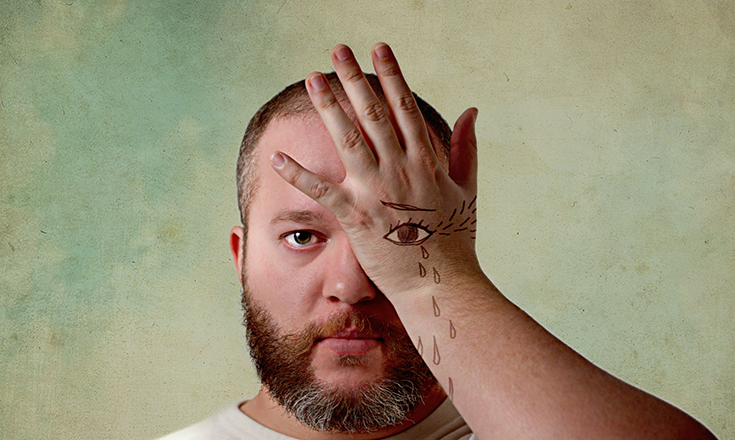5 STARS OUT OF 5 (Want to know exactly what our star ratings mean? Check out our explanations here.)
Therapy, the latest EP by Radical Face (the musical “face” of Ben Cooper) was released April 26th. With this new music, Radical Face has shifted gears but hasn’t fully changed.
Of his earlier work, I loved Ghost, but couldn’t get into Family Tree until it was completed. By the time I had wandered through The Roots, The Branches, and The Leaves, I appreciated hearing The Bastards released in EP form. Missing Film, the most recent Radical Face LP, released in 2018, echoed familiar sounds while clearly paving the way for expansion. Therapy follows this, branching out further into uncharted territory.
I saw Cooper live when he briefly joined the Odd Man Out Tour in 2005, or as fans called it “The Ben’s plus Rufus.” It was that time Ben Lee, Ben Folds, Ben Kweller, and Ben Cooper somehow outshone Rufus Wainwright. Cooper really was the odd man out; critics paid excessive attention to Wainwright’s sexuality while ignoring Cooper’s own coming out story. Cooper was working with synths, guitars, and pianos while the majority of musicians in that particular hipster class preferred single instrumentals; Cooper was performing as a one man army.
To this day, Ben Cooper’s alter ego Radical Face prefers to work alone, sampling in his home studio and filming most of his videos with friends. Cooper chose to process his own fraught personal history by creating a fictional family in his works collectively titled The Family Tree. This particular creative process left Cooper emotionally depleted, leading him to seek out therapy. With the Therapy EP, Ben has let go of his past and has delved into the trenches of his present and future. Rather than a saga, Cooper has focused on a simple but scarred moment. Although Cooper says he is incredibly proud of the trilogy of The Family Tree, the time had come to focus on the here and now. In speaking of the first single off Therapy, Cooper stated “‘Hard of Hearing‘ is about the awkward middle period, that space where you don’t feel well at all, but you can outwardly function again. I learned from regular work with a therapist that you usually understand things long before you feel them, and that can create a sense of limbo.”
The second single released, Doubt, became Radical Face’s most difficult and yet seemingly simple music video. Cooper both directed and stars in the accompanying video, in which his face is seen in tight close-up; sometimes bruised, sometimes with a bandage wrapped around the forehead, or scotch tape contorting his nose, or phantom hands reaching into the frame to push and pull on his beard and cheeks. Changing and flashing lights, colors, and background patterns seem to transform his appearance even more. “This is the most technically and physically demanding video I’ve ever done, as everything was done on-camera,” says Cooper of “Doubt”. “No post was added at all, not even basics like color-correction. The idea was to build an evolving portrait, fading between extreme lighting and background differences while singing. The only problem was, for this idea to work, I couldn’t move at all between takes.” When I first watched the video, I wasn’t that impressed. After reading about the process I re-watched it stunned; in an age of special effects we don’t always notice when someone takes the hard road.
The six-song EP has been recorded twice; produced and acoustic. The acoustic version should be released later this week. Cooper said via YouTube “if you don’t like the first version, stay tuned. Or don’t.” I appreciated Therapy being released as an EP; an LP might have been too much. Like actual therapy, I need just under an hour and then I’m overloaded. Saturated though this EP is, I don’t come away overwhelmed: it’s perfect.
As a follower of Ben Cooper and his Radical Face persona, I’ve been hearing these songs drop slowly over the past few months. As someone who has also spent a lot of time in therapy, I appreciate an artist truly showing their work. Much like with the Family Tree project, Cooper is working with archetypes. Although this work is incredibly personal to Cooper, the themes are universal; though songs like Guilt and Doubt were written to reflect personal challenges and growth, they are written so that the listener is drawn into a web of imagery and sigils from the collective unconscious. Work like this leaves me with a profound sense of future nostalgia; even the songs that don’t speak to me right now probably will someday. I don’t want to name a favorite track; the more I listen the more what I’m hearing changes. The beauty of Cooper’s layered piano and guitar are matched with complex lyrics. Right now, I can’t listen to Dead Ends enough; it’s like someone tore my own thoughts from me.
I recently sat in on a Q+A with Cooper on YouTube, who says he hates social media but loves YouTube. Although he didn’t have time to answer my questions about Therapy, I did learn that many of the clapping sounds in his songs are made by slapping his belly, as it is more resonant than two hands, and that his decision to make his work free of copyright is something he felt strongly about; having his early work owned by someone else was troubling and now there are all of these amazing songs that people can work with and avoid royalty issues. He also said he knew he needed a professional when he couldn’t laugh anymore; I think those indicators are powerful and it honestly helps me when someone I look up to says they need help. It makes the world less lonely.
This work gets 5 out of 5 stars. A part of me wishes there were more songs, but I would rather have a work leaving me wanting more. I am extremely excited that Radical Face has re-emerged through The Covers with a cohesive work rivaling Ghost. Therapy is a process, and the results are worth it. Radical Face currently has no tour plans, which hopefully means we’ll be hearing and seeing more.
Author

Morgan is a Seattle Central alumni currently attending Oregon State University where she is majoring in Anthropology. In addition to writing, she enjoys painting and linguistics. She lives in a very small house with a very fat cat.







[…] on my gushing review of the latest EP release by Radical Face, it should come as no surprise that I found seeing one of […]